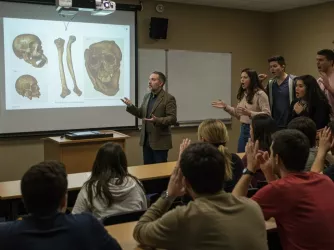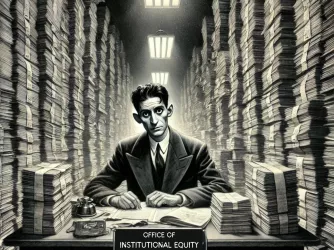Table of Contents
Wright State University Bans Christian Group from Campus
Today's FIRE press release comes out of Dayton, Ohio, where Wright State University has banned a Christian group, the Campus Bible Fellowship, from meeting on campus because of the group's constitutional requirements for voting members. Here's an excerpt that explains how this all started:
After more than 30 years of existence as a registered student organization at Wright State, the Campus Bible Fellowship (CBF) was prohibited from re-registering in 2009. On January 30, according to CBF representatives Joe Hollaway and Gary Holtz, CBF was informed by Wright State's Office of Student Activities that its registration was being denied for two reasons. First, CBF refused to adopt university-mandated nondiscrimination language in its membership requirements that would have stripped the group of the right to require voting members to adhere to religious and behavioral standards. (Nonvoting members did not have to meet these standards). Second, Wright State objected to the requirement in CBF's constitution that voting members "accept Jesus Christ as their personal savior" and subscribe to the group's articles of faith. Strangely, however, Wright State has so far refused to put this decision in writing.
FIRE wrote to Wright State President David R. Hopkins in February, telling him that "if Wright State is to allow expressive organizations to exist on its campus at all, it must allow religious organizations to exist, to define their missions, [and] to select their own members." We also referred him to our victories in similar religious liberty cases at Ohio State University and at Tufts University. (We also could have referred him to our victories at Louisiana State University and the University of North Carolina – Chapel Hill, just for good measure, but we think our point was made.)
Unfortunately, though, Hopkins has yet to respond. In fact, nobody from Wright State has responded in writing to anything sent to them by either CBF or FIRE—always a bad sign. For instance, on February 26, Wright State General Counsel Gwen Mattison phoned FIRE's Adam Kissel to inform us that Wright State would be recognizing CBF for the remainder of the academic year, but that the group would be required to make changes to its constitution when reapplying in May. But when Kissel e-mailed Mattison to confirm the substance of the conversation, Mattison refused, replying only: "Incorrect--no other reply will be forthcoming." This was disappointing, as we thought we were making progress. However, it's FIRE's policy to get commitments like this in writing. The fact that Mattison wouldn't do so—even just to correct us if we had misunderstood something—speaks volumes.
More puzzling still is the fact that Wright State appears to have a policy that, if adhered to, would make this whole problem go away. The policy states that organizations created "for the purpose of deepening the religious faith of students within the context of a denominational or interdenominational grouping ... may register through customary procedures," even if they exclude members on the basis of religious views. Why Wright State is not following its own policy in this matter is a mystery to us.
Whenever FIRE has a case like this, we always get a lot of questions similar to the following: Why should a religious group be able to keep non-Christians out of the group when we don't allow, for instance, the chess club to keep African-Americans out of the group? This is admittedly a confusing issue, because the answer involves both the expressive purpose of the group and the vital distinction between status and belief.
Groups with an expressive purpose include virtually all religious and political groups, or any other group for whom a major focus is to spread the ideas of the group. The Campus Bible Fellowship is certainly such a group, as would be the College Republicans or Democrats, the campus PETA chapter, etc. Such groups have a very good reason for requiring their members and leaders to subscribe to the beliefs of the group—if they didn't, the group's message would lack credibility. To take an obvious example, consider the futility of someone who does not subscribe to Christian beliefs trying to convince others that they should become Christians.
On a more practical level, this also serves to prevent expressive groups from being hijacked by their opponents. For instance, if the College Republicans have 50 members, and the group is not allowed to choose its voting members and leaders based on their beliefs, 100 Democrats could show up, vote themselves into the leadership of the College Republicans, and shut down the group. Any minority group is a potential victim of such a maneuver, and allowing such things to happen would squelch opportunity on campus, not enhance it.
The related distinction between status and belief is also critical. While race, sex, etc., are examples of a person's status, religion is a belief and is subject to change. As FIRE wrote in its amicus brief in the case of Christian Legal Society v. Walker:
There is a difference between making a determination on the basis of an immutable characteristic and making a choice on the basis of changeable personal beliefs and rules of conduct. For example, Muslim Malaysians would not be suitable for voting membership in the Christian Legal Society not because of their Asian heritage but because Muslims tend to be poor ambassadors for the (constitutionally protected) idea that Jesus is Lord.
Wright State's demand that the Campus Bible Fellowship accept as voting members those who disagree with the group's tenets is equally illogical. Restricting voting membership on the basis of belief is certainly "discrimination" of a sort. But not all discrimination is illegal; nor should it be, if campuses, and our society at large, are to avoid a stifling and repressive uniformity. Those who might wish to join CBF but who do not adhere to its beliefs are free to form another group—and they must enjoy the same right to define their group's expressive purpose as CBF. Freedom of association is just as valuable a right as freedom of expression, and the two go hand-in-hand. As a public institution, Wright State must correct its error.
Recent Articles
FIRE’s award-winning Newsdesk covers the free speech news you need to stay informed.

UPDATE: Another federal appeals court backs academic free speech for public employees

Feds to Columbia: ‘You want $400 million in contracts back? Do this (or else)’

A picture is worth a thousand words — unless a college district bans it
